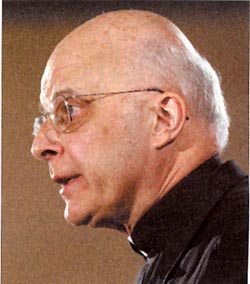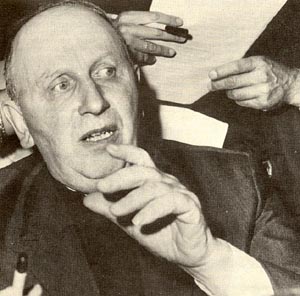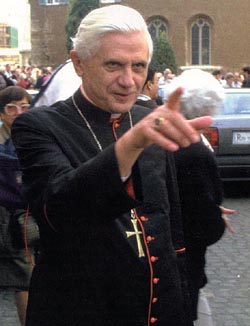 |
NEWS: February 26, 2004
Bird’s Eye View of the News
Atila Sinke Guimarães

Card. George offers a remedy that doesn't cure the illness - America, February 16, 2004 |
FROM A SHOUT TO A WHISPER – The moral authority of the Catholic Church in the United States continues to be discredited. Her voice is today perhaps more a whisper than the shout it once was, said Cardinal Francis George of Chicago. While the message remains the same, “the moral force of the Church’s voice is quite weakened now,” the Cardinal affirmed on January 25. He pointed in particular to the crisis of sexual abuse by members of the clergy that is causing people to question the Church’s claim to moral authority. He did not present a remedy for the crisis except for this: “Listen carefully to the opponents. Why are they saying what they are saying?” (America, February 16, 2004).
It is indubitably a quite insufficient remedy to so grave an illness. One would expect that a solution offered would be more profound, such as to abandon the Freudian sexual orientation the seminaries and priesthood assumed after Vatican II, and return to the strict norms of moral behavior that governed seminaries and clergy before the Council. But no, the Cardinal didn’t go that far. He just suggests that the Hierarchy listen to the enemies. Is this an effective way to stop the problem? Is that even his intent?
CHANGING THE FACE OF THE CHURCH – The Catholic Church in England seems to be taking concrete steps to change the structure of its parishes. Some of the important dioceses of the country are consulting their parishioners to see how they would like to handle the priest shortage problem. Such consultations were made last year in Arundel & Brighton and Nottingham, and began last month in Leeds and Westminster.
A pastoral letter read at churches in Leeds two weeks ago warned that by 2018 there will be no more than 75 diocesan priests serving the diocese’s 114 parishes. Cardinal Cormac Murphy-O’Connor, the Primate of England and Archbishop of Westminster, has already warned that in the future some parishes will be without a resident priest, while others may have to close or merge. In an article published in the diocese’s newspaper, the Cardinal wrote that “changes of this nature are difficult and often painful. It is important that we plan and consult in the best way possible.”
While the process promises to be painful for the faithful, the Bishop of Leeds, David Konstant, is cheerful about such future prospects. “Sometimes the Church grows and expands. At other times she has the prune and cut back so as to stimulate stronger growth. Be of good cheer. The Lord is asking us to do something new,” he stated (The Tablet, January 31, 2004, p. 34).
What could be this ‘something new’ alluded to by Cardinal Murphy-O’Connor, and openly welcomed by Bishop Konstant? Besides the announced closing and merging of parishes, it most probably is a veiled invitation to the lay faithful – men and women – to take over all the ministries that don’t rely immediately on priests.

Congar: the Church must be de-clericalized - Temoignage, May 15, 1974 |
Therefore, the progressivist current that is dominating the Church seems to be taking advantage of the priest shortage to reach two of its goals:
- To finish with a priestly Church, and bring the laypeople to “power”;
- To do away with large parishes and beautiful churches and try to reduce the meetings of the faithful to smaller numbers, moving in the direction of meetings in small, self-managed communities.
Is it a pie in the sky? It doesn’t seem so. Regarding this first goal, the well-informed Cardinal Yves Congar wrote these significant words during Vatican II:
- "We are still far from drawing the consequences of the rediscovery of the fact that the entire Church is one single people of God and that the faithful compose it along with the clergy. Implicitly, unwillingly, and even unconsciously, we have the idea that the Church is composed of the clergy, and that the faithful are merely their beneficiaries or clientele. This horrible conception is inscribed in so many structures and customs that it appears to be set in stone, unable to change. It is a betrayal of the truth. There is still much to be done to de-clericalize our conception of the Church." (1)

Ratzinger points to the end of the Church's grandeur - Inside the Vatican, January 1995 |
Regarding the second goal, shortly after the Council Cardinal Joseph Ratzinger wrote these lines:
“From today’s crisis, a Church will emerge tomorrow that will have lost a great deal. She will be small and …. will have to start from the beginning. She will no longer be able to fill many of the buildings created in her period of great splendor …. Contrary to what has happened until now, she will present herself much more as a community of volunteers ….
"As a small community, she will demand much more from the initiative of each of her members, and she will also certainly acknowledge new forms of ministry and raise up proven Christians who have a calling to the priesthood. The normal care of souls will be made by smaller communities, in social groups with some affinity. ….
"This will be achieved with effort. The process of crystallization and clarification will demand a great exertion. It will make her a poor Church and a Church of the little people …. All this will require time. The process will be slow and painful.” (2)
Here we have the plan. In French one says: À bon entendeur, salut! Which translates to: For those who understand what’s going on, greetings!
1. Y. Congar, Pour une Église servante at pauvre (Paris: Cerf, 1963), pp. 135-6.
2. J. Ratzinger, Fé e futuro (Petrópolis: Vozes, 1971), pp. 76-7.


Related Works of Interest
|
|
News | Home | Books | CDs | Search | Contact Us | Donate

© 2002- Tradition in Action, Inc. All Rights Reserved
|
 |
|